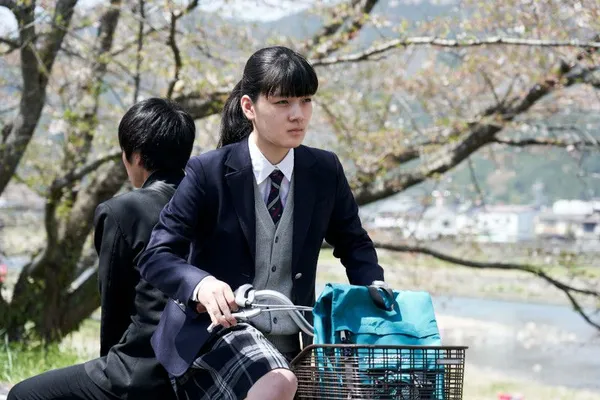Eye For Film >> Movies >> Yamabuki (2022) Film Review
Yamabuki
Reviewed by: Mateusz Tarwacki

On the steep, rocky hills near rural town Minawa in western Japan, a unique species of flower called yamabuki, or more broadly, the Japanese rose, grows. The yellow-blooming shrub likes to grow in secluded places and is very lonely, especially since it is the only representative of Kerria's genus, almost as lonely as the heroes of the latest film by Juichiro Yamasaki, entitled in honour of these exceptional flowers.
Yamabuki is a story about lost dreams, lost loved ones, longing for home and searching for one's place in the world. The stories of several heroes seemingly accidentally intertwine with each other, linking them with a complicated network of unconscious dependencies. Here one will meet a South Korean Chang-su ( (Kang Yoon-soo), a former equestrian athlete, who lost the opportunity to fulfill his sports dream, now working at Minawa's quarry, living with a woman who ran away with her infant daughter from her husband years ago. On the other side of town, teenage Yamabuki (Kilala Inori), living with her policeman father (Yohta Kawase), misses her mother and is trying to find meaning in her life through social protest actions. Chang-su's and young Yamabuki's lonely experiences unfold as if in parallel, only to cross each other in the highlights of Yamasaki's film.

There is a sad sentiment on the screen. The performance and the narrative method bring to mind a mixture that could have been a combination of Yasuhiro Ozu’s and Naomi Kawase’s movies. As if the social image of family relations in Tokyo Story had gone out for a walk to The Mourning Forest. As if a man were a random visitor not only to nature, but also to another human being – and under the influence of these accidental contacts, a profound change is taking place in him.
The feeling of nostalgic longing is also emphasised by Yamasaki's use of 16mm grainy tape, which makes Yamabuki look like a miraculously recovered memory. Moreover, it seems that this mood is not accidental and corresponds to the depressing mood of life in modern Japan – this course of life takes away the possibility of fulfilling dreams for most, a world in which it is increasingly difficult to take care of oneself.
The work by the Japanese director results in a lonely picture, but not devoid of a charming, melancholic sensitivity. While it is not an obvious matter for Japanese society to show emotions, Yamasaki writes another sensual page in the history of Japanese cinema, exploring the deeply wistful emotions to which everyone is entitled in the depths of their souls. After all, as Yamabuki recalls with her lost mother's words: "Sunflowers face the Sun, but you don't have to."
Reviewed on: 02 Feb 2022
















